This post is also available in:
 Indonesian
Indonesian
By Nisa Syahidah & Lugas Lukmanul Hakim
This is the fifth blog in our Women in Fisheries series.
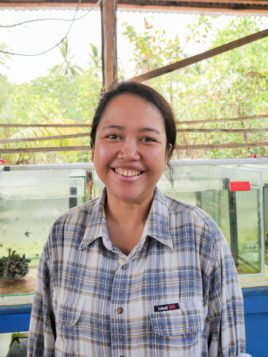
Ami Raini Putriraya | Photo: Nisa Syahidah
The sun had already set when we arrived in Gangga Satu Village, West Likupang, North Minahasa, North Sulawesi. The night is warm and I can hear Manado songs in the distance, drifting across the water from Bulutui Village which lies about an hour’s boat ride away.
The electricity had just kicked in, just as it does at six o’ clock every night. Bob turns on the lights at his house, where the YAPEKA team and I will spend the night. Bob is the Head of Government Affairs of Gangga Satu Village Government. He is also a local fisherman who knows everyone in the village and is a key influencer for the community.
“You know, Bob’s like our right hand in the village,” said Ami Raini Putriraya, YAPEKA’s Site Manager for North Sulawesi. “YAPEKA’s work here began with a socioeconomic survey and community-focused approach. Nothing would happen without Bob!” she says, beaming with appreciation.
YAPEKA is non-governmental organisation (NGO) with a broad scope of work, from environmental and social research, to introducing technology to communities for low-carbon development and developing livelihoods that are environmentally beneficial. Whilst it is actually based in West Java Province of Indonesia, YAPEKA has a strong presence – and strong leader, Ami – in North Minahasa.
Ami has been supporting the development of community-based octopus fisheries management in Bulutui and Gangga Satu since 2017. It’s not an easy task to promote responsible and sustainable fisheries, but Ami has helped build YAPEKA’s relationship with the fishers in both villages.
“The fishing community here in North Minahasa has been catching octopus since 1960. Octopus fetch a high price on international markets and so the demand is very high,” says Ami. However, after decades of unregulated fishing, fishers are noticing a decrease in octopus catches.
To combat this decline, YAPEKA are working with communities to rebuild their fishery. “There are more than 80 octopus fishers and eight collectors across both villages. We empower them to monitor their octopus catch so that they can start to manage the area through establishing catch season management”.
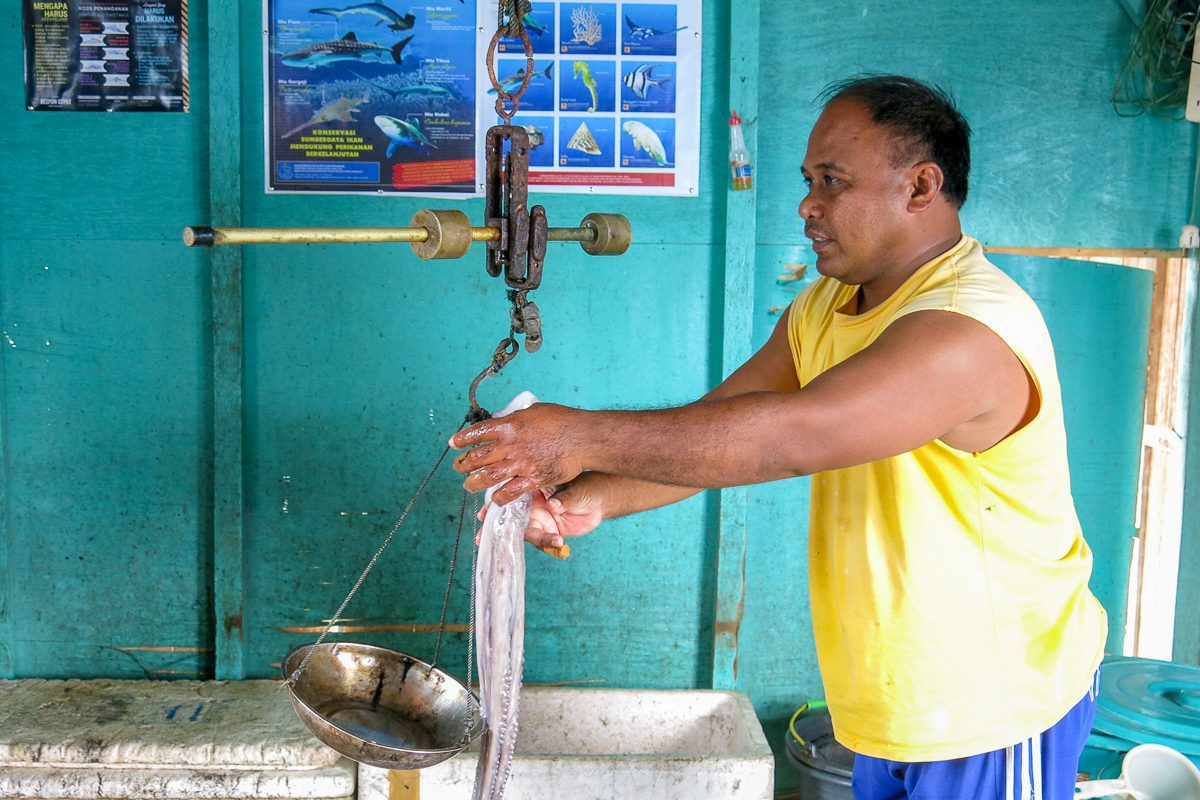
Asuari Sahari, the Head of Bulutui Village, weighing an octopus | Photo: Nisa Syahidah
Commitment to science and communities
Born in Semarang, Central Java, Ami spent her early childhood in the capital city of Jakarta. Ami studied biology for her bachelor’s degree from Gadjah Mada University in Yogyakarta, and later went abroad to study forest and nature conservation for her master’s degree at Wageningen University and Research in the Netherlands.
During her undergraduate studies, Ami focused on terrestrial biology – carrying out research on the silvery gibbon (Hylobates moloch/owa Jawa) and grey heron (Ardea cinerea/cangak abu). But as it turned out, Ami was destined to fall in love with marine conservation.
“My first marine conservation work was during my thesis research,” Ami said. “The project was to replicate the Bahoi Village’s marine protected area initiative in other villages of North Minahasa. It was part of YAPEKA’s collaboration project with the Good Planet Foundation,” she added.
After completing her studies in the Netherlands, Ami returned to Indonesia and started working with YAPEKA. In her early days there, she learned about marine ecology: reef health monitoring, seagrass and mangrove ecosystems, and even social-ecological systems.
Now, she makes sure that communities in North Minahasa can benefit from conservation. “Community empowerment is the core of YAPEKA’s work. We believe that fishing communities can independently and sustainably manage their local fisheries in the long term.”
But achieving their mission hasn’t been simple. In Bulutui, where YAPEKA first initiated the octopus fisheries management programme, the use of destructive fishing practices was commonplace. Slowly, with guidance and a culturally sensitive approach from YAPEKA, fishers began to recognise that marine resources are delicate and should be protected. By nurturing locally led conservation initiatives, the communities’ livelihoods could be sustained for future generations.
Perseverance is key
“We learned two vital lessons here. Firstly, never give up on the communities, no matter how challenging the circumstances,” Ami stretches her leg, adjusting her sitting position. “Secondly, we found we needed to adjust our approaches between generations, to maintain the community’s willingness and interest in conservation,” she concluded.
Having open conversations with each community they work with, listening to their needs and perspectives, allows YAPEKA to understand how they can best support that specific community. Ami believes that this kind of effective, two-way communication is essential for their work.
Her relationship-building role doesn’t end with the partner communities: “It’s not all about writing reports and proposals, it’s about maintaining strong partnerships with governments, academics, communities, fellow NGOs – all the stakeholders involved,” she explains. “It’s the spirit of co-management. We are not working alone in this.”
Women in conservation
In traditional Indonesian society, there is a stereotype that continues to limit womens’ role to the domestic sector. Yet, Ami has witnessed positive change over the years, with more women seen in strategic positions at work.
“Here in Sulawesi Utara, the voice of women is heard. I’m happy to see some female chiefs in provincial government, or women as heads of villages,” Ami shared her joy, which made me smile as well.
I’ve found that women often have a long-term vision. Perhaps it’s because traditional female roles involve managing the household and looking after the family’s nutritional needs, meaning that they have excellent planning skills, and are usually more aware of their surroundings and environment. That’s why it’s important to involve women in conservation efforts. Women give valuable insights and a different perspective on environmental issues and natural resources management.” Ami concluded.
In 2016, YAPEKA supported the women of Bahoi Village to establish community groups that enabled eco-tourism development in the village and as a result, more women involved themselves in homestay activities. The programme developed livelihood alternatives for the community which improved their quality of life, whilst simultaneously encouraging them to protect their eco-tourism assets – mangroves, seagrass, and coral reefs.
What keeps Ami going?
“Two years ago I was at a gathering with stakeholders and the local community in Sangihe, North Sulawesi. We were explaining the progress of coastal management and conservation programmes over the last two years. After our presentation, one village leader raised his hand, requesting a chance to speak. He simply said ‘Thank you’” remembered Ami. “This touched me deeply, I almost cried.”
For Ami, it was an indescribable feeling. “It was the most real and highest reward for me,” she told me, her eyes shining.
As the night went on, I listened to Ami as she expressed her excitement about what the future might hold – all she wants to do is continue her meaningful and impactful work with coastal communities.
Read more from our Women in Fisheries series:
Building confidence through communication: an interview with Mursiati of FORKANI


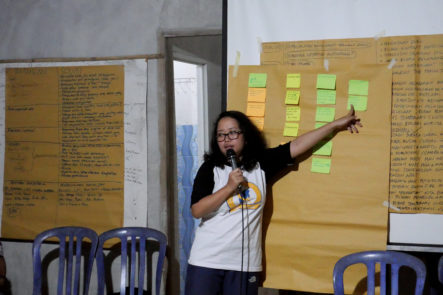
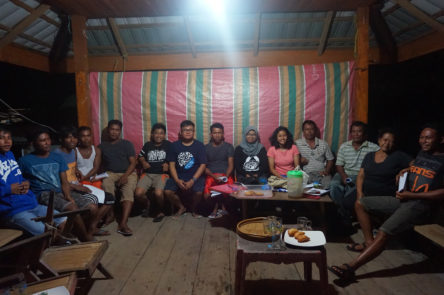
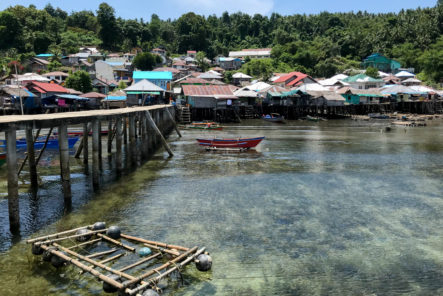
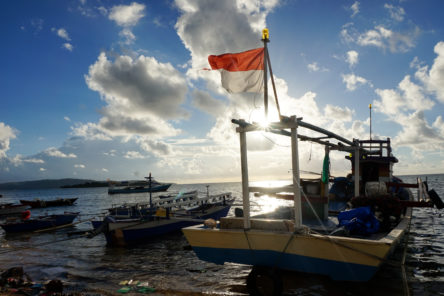
She is very courageous.